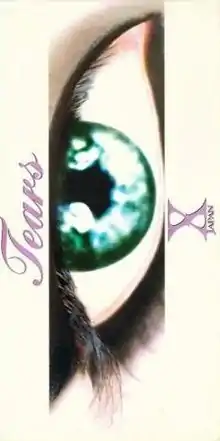Tears (X Japan song)
"Tears" is the ninth single by the Japanese heavy metal band X Japan, released on November 10, 1993.
| "Tears" | ||||
|---|---|---|---|---|
 | ||||
| Single by X Japan | ||||
| from the album Dahlia | ||||
| Released | November 10, 1993 | |||
| Recorded | One on One Recording | |||
| Genre | Heavy metal | |||
| Length | 15:36 | |||
| Label | MMG | |||
| Songwriter(s) | Yoshiki | |||
| Producer(s) | Yoshiki | |||
| X Japan singles chronology | ||||
| ||||
| Audio sample | ||||
"Tears"
| ||||
Overview
The song was debuted/first performed on December 31, 1992, on a broadcast of NHK's Kouhaku Uta Gassen and featured all singers on this episode. Hide, their guitarist, had the idea to distribute the lyrics starting on the first stanza with Akiko Wada's voice. It is the band's first single to be released under the name X Japan and the first to feature Heath on bass. The ballad was written and composed solely by Yoshiki about the death of his father, but he co-credited it to the alias Hitomi Shiratori (白鳥瞳) because he was concerned how fans would react to a softer song from the band.[1] It would later appear on the album Dahlia and was also used as the theme song for the Japanese TV drama Nikushimi ni Hohoende (憎しみに微笑んで).[2]
The B-side is the lyric-less classical version of the song, which was previously on Yoshiki's solo album Eternal Melody. It was produced, arranged and conducted by famed music producer George Martin and performed by the London Philharmonic Orchestra.[3]
A live performance of "Tears" was included as the B-side to their 1996 single "Dahlia". Yoshiki's MySpace streams a different version of the song entitled "Tears (Unreleased Version)".[4]
The title song was covered by South Korean rock band TRAX, as a b-side on the Japanese version of their "Scorpio" single, which was produced by Yoshiki.[5] They also covered it in Korean on the Korean version of their aforementioned single. The song was also covered by MC the Max in 2002, titled Goodbye for Now (잠시만 안녕).[6]
In 2004, "Tears" was used as the theme song for the film Windstruck, becoming the first Japanese song to be featured in a Korean film after World War II.[7][8]
Commercial performance
The song reached number 2 on the Oricon charts, and charted for 16 weeks.[9] In 1993, with 380,150 copies sold was the 77th best-selling single of the year, and in 1994, with 456,790 copies sold was the 50th best-selling single. By July 1996, it was certified as double Platinum by RIAJ, making it the band's best-selling single.[10]
Track listing
All music is composed by Yoshiki, track 1 lyrics by Hitomi Shiratori and Yoshiki.
| No. | Title | Length |
|---|---|---|
| 1. | "Tears" (X Japan Version) | 10:28 |
| 2. | "Tears" (Classic Version) | 5:02 |
Personnel
- X Japan
- Other
- Co-producer – X Japan
- Strings arranger, conductor – Dick Marx
- Strings performer – Y&D Orchestra
- Engineers – Rob Jacobs, Rich Breen, Mike Ging
- Assistant engineers – Mike Stock, Tal Miller
- Mixing – Mike Shipley
- Mastering – Stephen Marcussen (Precision Studio)
References
- Hartmann, Graham. "X Japan's Yoshiki Plays 'Wikipedia: Fact or Fiction?'". Loudwire. Retrieved 2014-09-18.
- Jonathan Clements, Motoko Tamamuro (2003). The Dorama Encyclopedia: A Guide to Japanese TV Drama Since 1953. Stone Bridge Press. p. 280. ISBN 9781880656815.
- Strauss, Neil (June 18, 1998). "THE POP LIFE; End of a Life, End of an Era". nytimes.com. Retrieved November 13, 2011.
- "Songs". Yoshiki Myspace. Retrieved 2017-04-05.
- "Scorpio". cdjapan.co.jp. Retrieved 2017-05-15.
- "이수 '잠시만 안녕' 재조명…X재팬 요시키 작곡 리메이크 2002년 음원차트 올킬" (in Korean). 이투데이. 2015-01-31. Retrieved 2018-06-04.
- "<내 여자친구를 소개합니다> 일본 도쿄 프리미어 대성황!" (in Korean). 코리아필름. 2004-12-02. Retrieved 2017-05-05.
- "X-Japan'영화 여친소 내 노래 테마곡써 기쁘다'". No Cut News (in Korean). June 4, 2004. Retrieved 2021-02-06.
- X JAPANのシングル売り上げランキング. oricon.co.jp (in Japanese). Oricon. Retrieved December 10, 2011.
- "月次認定作品 認定年月:1996年 7月" (in Japanese). RIAJ. Retrieved 2017-05-11.